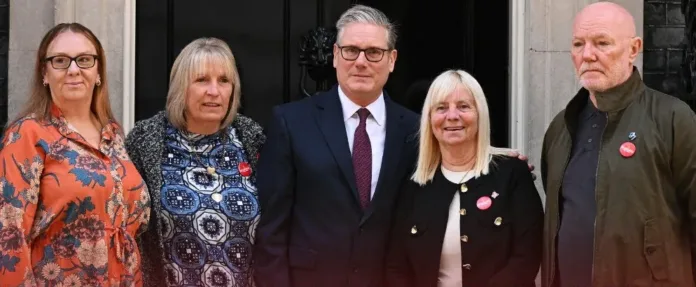Starmer meets grieving Hillsborough families as landmark law promises to end cover-ups
Outside Number 10, emotion hung heavy in the air as Prime Minister Keir Starmer welcomed representatives of the Hillsborough families. For more than three decades they had battled for truth and justice. On Tuesday, their unyielding campaign reached a historic breakthrough: the Hillsborough Law Bill finally arrived in Parliament.
The prime minister met with Steve Kelly, Charlotte Hennessy, Margaret Aspinall and Sue Roberts — four figures who have carried the voices of the 97 Liverpool supporters killed in the 1989 disaster. Starmer embraced them on Downing Street, marking a symbolic end to years of state resistance and official denial.
Speaking afterwards, Starmer made his commitment crystal clear: “I made it very clear to them we’ve worked hard to get to where we are with this law. Yes, there’s been constant battles. They’ve been having these battles for years. But we have pushed through to get this law into a place where the families think it’s the right law and we’re not going to water it down now.”
His words echoed the determination of the campaigners. Margaret Aspinall, whose teenage son James died at Hillsborough, has fought relentlessly for change. Starmer reflected on his long relationship with her, recalling their first meeting when he was Director of Public Prosecutions: “I gave her my word that we would deliver this law. I’ve delivered on that promise and I’ve given her my word that we won’t water it down.”
The government described the Hillsborough Law as a seismic shift. Its central aim is to dismantle the “culture of cover-ups” that shielded authorities from accountability after the disaster. The legislation introduces a new professional and legal duty of candour, compelling public officials to act with honesty and integrity or face criminal sanctions.
Equally significant is the expansion of legal aid. For the first time in a decade, bereaved families will receive non-means tested support at inquests, with the costs covered by the public bodies involved. This provision is designed to prevent the state from marshalling vast legal teams against ordinary citizens, a tactic that has long left families silenced and outmatched.
Further measures tighten the conduct of public bodies. Spending must now be proportionate, ensuring both sides stand on equal legal ground. State representatives will be bound by strict guidance demanding openness and honesty before coroners. For the gravest breaches, a new offence of misleading the public will carry criminal penalties.
This sweeping package represents the largest change in the justice system’s treatment of citizens since the Human Rights Act of 1998. Its supporters believe it will prevent any repeat of the devastating institutional failures that compounded the trauma of the Hillsborough disaster.
For families, campaigners and survivors, the day carried a weight that was impossible to miss. The sight of Hillsborough representatives walking into Downing Street was a visual confirmation that their tireless struggle had not been in vain. After years of grief, frustration and courtroom battles, they had compelled the state to act.
Starmer emphasised urgency: “What we need to do is get it onto the statute as quickly as possible.” For those who lost loved ones 36 years ago, speed now matters. Many parents and campaigners have already passed away without seeing justice done.
The bill’s progress is testament to the power of persistence against entrenched opposition. It stands as a warning to institutions that silence and obfuscation will no longer be tolerated. Most importantly, it promises a legacy for the 97 who never came home from Hillsborough — a law born of pain, resilience and the refusal to be ignored
